#localisation
Text
Every now and then I think about how subtitles (or dubs), and thus translation choices, shape our perception of the media we consume. It's so interesting. I'd wager anyone who speaks two (or more) languages knows the feeling of "yeah, that's what it literally translates to, but that's not what it means" or has answered a question like "how do you say _____ in (language)?" with "you don't, it's just … not a thing, we don't say that."
I've had my fair share of "[SHIP] are [married/soulmates/fated/FANCY TERM], it's text!" "[CHARACTER A] calls [CHARACTER B] [ENDEARMENT/NICKNAME], it's text!" and every time. Every time I'm just like. Do they though. Is it though. And a lot of the time, this means seeking out alternative translations, or translation meta from fluent or native speakers, or sometimes from language learners of the language the piece of media is originally in.
Why does it matter? Maybe it doesn't. To lots of people, it doesn't. People have different interests and priorities in fiction and the way they interact with it. It's great. It matters to me because back in the early 2000s, I had dial-up internet. Video or audio media that wasn't available through my local library very much wasn't available, but fanfiction was. So I started to read English language Gundam Wing fanfic before I ever had a chance to watch the show.
When I did get around to watching Gundam Wing, it was the original Japanese dub. Some of the characters were almost unrecognisable to me, and first I doubted my Japanese language ability, then, after checking some bits with friends, I wondered why even my favourite writers, writers I knew to be consistent in other things, had made these characters seem so different … until I had the chance to watch the US-English dub a few years later. Going by that adaptation, the characterisation from all those stories suddenly made a lot more sense. And the thing is, that interpretation is also valid! They just took it a direction that was a larger leap for me to make.
Loose adaptations and very free translations have become less frequent since, or maybe my taste just hasn't led me their way, but the issue at the core is still a thing: Supernatural fandom got different nuances of endings for their show depending on the language they watched it in. CQL and MDZS fandom and the never-ending discussions about 知己 vs soulmate vs Other Options. A subset of VLD fans looking at a specific clip in all the different languages to see what was being said/implied in which dub, and how different translators interpreted the same English original line. The list is pretty much endless.
And that's … idk if it's fine, but it's what happens! A lot of the time, concepts -- expressed in language -- don't translate 1:1. The larger the cultural gap, the larger the gaps between the way concepts are expressed or understood also tend to be. Other times, there is a literal translation that works but isn't very idiomatic because there's a register mismatch or worse.
And that's even before cultural assumptions come in.
It's normal to have those. It's also important to remember that things like "thanks I hate it" as a sentiment of praise/affection, while the words translate literally quite easily, emphatically isn't easy to translate in the sense anglophone internet users the phrase.
Every translation is, at some level, a transformative work. Sometimes expressions or concepts or even single words simply don't have an exact equivalent in the target language and need to be interpreted at the translator's discretion, especially when going from a high-context/listener-responsible source language to a low-context/speaker-responsible target language (where high-context/listener responsible roughly means a large amount of contextual information can be omitted by the speaker because it's the listener's responsibility to infer it and ask for clarification if needed, and low-context/speaker-responsible roughly means a lot of information needs to be codified in speech, i.e. the speaker is responsible for providing sufficiently explicit context and will be blamed if it's lacking).
Is this a mouse or a rat? Guess based on context clues! High-context languages can and frequently do omit entire parts of speech that lower-context/speaker-responsible languages like English regard as essential, such as the grammatical subject of a sentence: the equivalent of "Go?" - "Go." does largely the same amount of heavy lifting as "is he/she/it/are you/they/we going?" - "yes, I am/he/she/it is/we/you/they are" in several listener-responsible languages, but tends to seem clumsy or incomplete in more speaker-responsible ones. This does NOT mean the listener-responsible language is clumsy. It's arguably more efficient! And reversely, saying "Are you going?" - "I am (going)" might seem unnecessarily convoluted and clumsy in a listener-responsible language. All depending on context.
This gets tricky both when the ambiguity of the missing subject of the sentence is clearly important (is speaker A asking "are you going" or "is she going"? wait until next chapter and find out!) AND when it's important that the translator assign an explicit subject in order for the sentence to make sense in the target language. For our example, depending on context, something like "are we all going?" - "yes" or "they going, too?" might work. Context!
As a consequence of this, sometimes, translation adds things – we gain things in translation, so to speak. Sometimes, it's because the target language needs the extra information (like the subject in the examples above), sometimes it's because the target language actually differentiates between mouse and rat even though the source language doesn't. However, because in most cases translators don't have access to the original authors, or even the original authors' agencies to ask for clarification (and in most cases wouldn't get paid for the time to put in this extra work even if they did), this kind of addition is almost always an interpretation. Sometimes made with a lot of certainty, sometimes it's more of a "fuck it, I've got to put something and hope it doesn't get proven wrong next episode/chapter/ten seasons down" (especially fun when you're working on a series that's in progress).
For the vast majority of cases, several translations are valid. Some may be more far-fetched than others, and there'll always be subjectivity to whether something was translated effectively, what "effectively" even means …
ANYWAY. I think my point is … how interesting, how cool is it that engaging with media in multiple languages will always yield multiple, often equally valid but just sliiiiightly different versions of that piece of media? And that I'd love more conversations about how, the second we (as folks who don't speak the material's original language) start picking the subtitle or dub wording apart for meta, we're basically working from a secondary source, and if we're doing due diligence, to which extent do we need to check there's nothing substantial being (literally) lost -- or added! -- in translation?
#translation#linguistics (sorta)#I love language so much#long post#subtitling#dubbing#transformative work#if you read all the way to the end - THANK YOU I am so impressed#localisation#this is not an academic essay but I still feel bad for not citing sources#low vs high context cultures and languages are concepts from intercultural communication studies#but idk how up to date that is or whether folks even still actually use them#I know they oversimplify things#but it helped me say what I was trying to here so shrug#languages#language soup#meta#language meta#fandom meta of sorts#thanks for the help sorting this out kayla <3#my nonsense
1K notes
·
View notes
Text
Most inappropriate anime character to be given a thick Russian accent in the English dub – go.
5K notes
·
View notes
Text
WHY DOES JEAN SAY "SHITKID" - a language theory


Ahh, I saw a post on tumblr here asking why Jean uses "shitkid" as an insult, and I forgot to respond, here is my theory:
English swears in most in sexual manners, "fuck" being the main one, French in scatological manners, "merde" being the big one.
Thus, French uses "de merde" (-of shit) as emphasis, like English uses "fucking", i.e.: "putain de merde" (fucking asshole), "truc de merde" (fucking thing that isn't working), "peur de merde" (fucking scared)
"shit" (noun) is just his native language way of using emphasis.
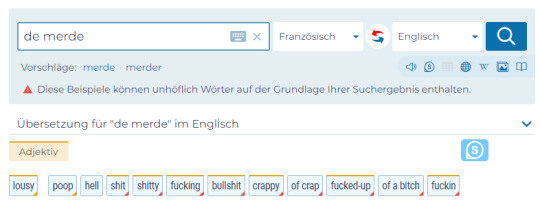
So he is calling Harry a "fucking child", putting emphasis on his tantrums, misbehaviour, immaturity, etc. As people can switch back to their native language when getting emotional, his native "gosse de merde/petit merdeux" probably became "shitkid", and it stuck, that is my theory.
I quickly checked what his real French insult is, and it is "clown de service" (service/professional clown). Again, stressing Harry's unacceptable behaviour *at work*. "Clown" definitely goes harder in the French language as an insult, stressing the unprofessional conduct.
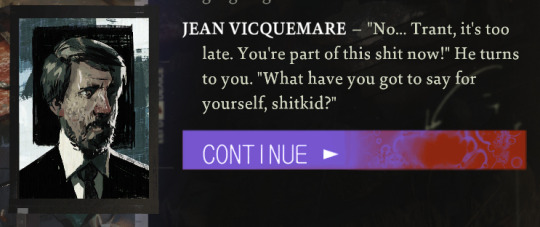
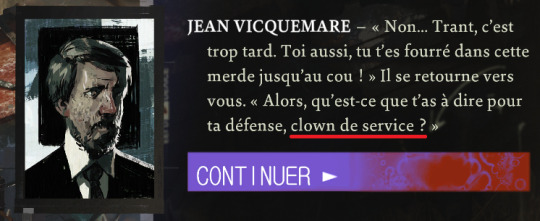
So we have both French with "professional clown" and German with "jelly head" as localisations for "shitkid", and I really like both of them, they fit their respective languages really well! And the English one gives him a unique insult that loops back to the structure of his native language! :D
#disco elysium#german disco elysium#jean vicquemare#shitkid#fun with translation#localisation#swearing#harry du bois#hdb#I am having tons of fun with these localisations#I will post more about the German version soon again!#french language
819 notes
·
View notes
Text
I'm a big fan of localisation. I believe the goal of a translation should be to keep as much meaning and nuance as possible from the original. Localisation is key to this. Language and culture are inextricably linked, which means you must engage in cultural education and/or localisation to successfully translate. Cultural education is preferable, but in many cases it is not appropriate (not great having to pause every few seconds to read a translator note when you want to turn your brain off and watch a show). However, I think sometimes, translators take the wrong approach to localisation, and I want to talk about that here.
There was an example of "bad" localisation given by a twitter user in this Sarah Moon video: the example was anime characters subbed to use zoomer slang like "sus" and "cringe". I actually think that is an example of good localisation. I am not talking about that kind of thing.

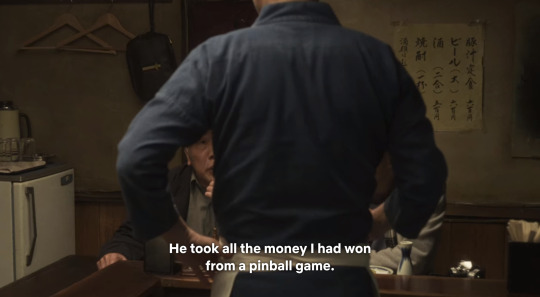
This scene from 深夜食堂 (Midnight Diner) made me want to write this post. パチンコ has been translated as "pinball". I'm sure there are people reading that translation and cringing, just like I did! I tried to put my finger on what irked me so much about it and I realised: this localisation is localising the wrong part of the meaning of パチンコ.
Part of localising is choosing the closest cultural equivalent of a concept. This inevitably means losing some of the specific details of the original word, but usually those details aren't important (if the whole cultural concept is important, you should probably just use a translator's note IMO). For example, the word パチンコ has lots of bits of meaning in it: "gambling" "played on a machine", "time killer", "uses small metal balls", "generally played by older men", "big flashy lights", "money sink", and so on. In this context, the character is talking about "winning money" from パチンコ, so you'd expect at the very least that the localised word would preserve the "gambling" and "money sink" bits of meaning. However, instead they chose to preserve the "small metal balls" and "big flashy lights" bits of meaning (まさかの!). This is a very silly choice because those bits of meaning don't have a shred of relevance to this scene, or any other scene in this story at all. I can see a context in which "pinball" is the best possible localisation for パチンコ. But this was not it, and not even close. I've never heard of anyone winning money from pinball.
I think if I were a translator, my process for localisation would be to break down the word into those bits of meaning, then rank the bits of meaning in terms of relevance to the line/scene/story, then pick a localised word that hits as many of the higher ranked meanings as possible. In this case, there are many better localisations (read: localisations with meanings more relevant to the scene). If I were localising it, I would probably do this: "He took all the money I won from the pokies." but I am aware that pokies is an Australianism. Assuming I was localising for a global english speaking audience: "He took all the money I won from a slot machine".
(TBH though, I don't think パチンコ needs to be localised because the english equivalent loanword, pachinko, is already well known enough to be used in english subtitles imo)
222 notes
·
View notes
Text
“Cultural pluralism and multilingualism are the planetary norm. We seek the balance between cosmopolitan pluralism and deep local consciousness. We are asking how the whole human race can regain self-determination in place after centuries of having been disenfranchised by hierarchy and/or centralized power. Do not confuse this exercise with "nationalism", which is exactly the opposite, the impostor, the puppet of the State, the grinning ghost of the lost community.”
—Gary Snyder, The Practice of the Wild.
#cultural pluralism#culture#pluralism#community#state#hierarchy#nationalism#power#decentralisation#local#localisation#localism
23 notes
·
View notes
Text
Hmm, XSEED have released their first localisation blog for the upcoming Story of Seasons: A Wonderful Life remake?
OK, let's see what goodies they have to share...

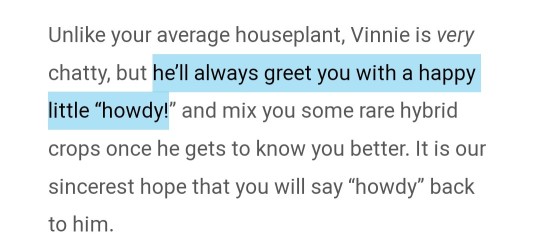
Oh...
...
Oh no...
...
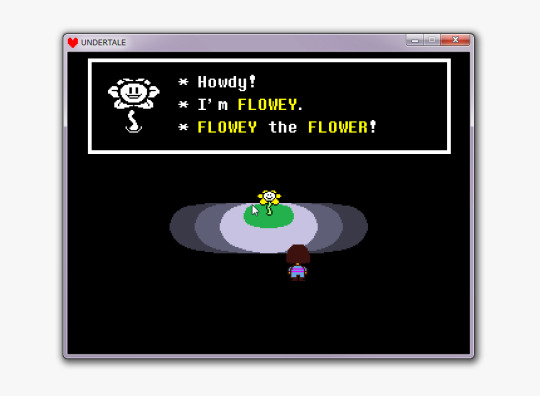
#harvest moon#Story of seasons#A wonderful life#Awl remake#bokumono#Localisation#Awl tartan#Flowey the flower#Undertale#Sorry ^^;#I had to... ^^;#Vinnie the vine awl
88 notes
·
View notes
Text
Interested if anyone knows anything about the nuances of what Utena is saying in Japanese here and how well the translation conveys it
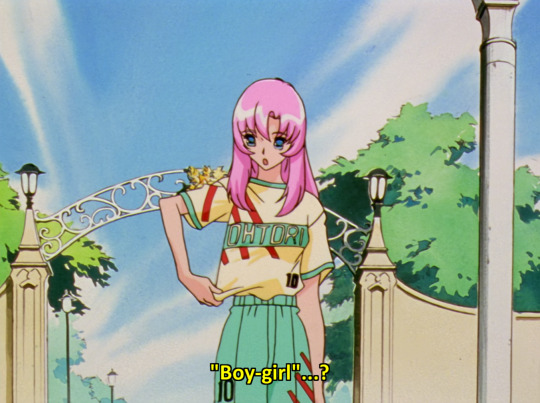
#utena tenjou#tenjou utena#utena#revolutionary girl utena#shoujo kakumei utena#utena la fillette révolutionnaire#translation#localisation#anime translation#anime localisation#japanese to english translation#japanese to english localisation#japanese-to-english translation#japanese-to-english localisation
45 notes
·
View notes
Text
There is localisation discourse again.
And I fucking hate it every time.
You can't translate anything literally.
That's not how language works.
Language specific idioms, tone and voice alone make such a difference.
More than that, however, there is often an aspect to this all that I think I haven't talked about much I think:
This kind of criticism often comes from people who are monolingual.
Aside from my native language, I know a good amount of English and German and a little bit of Latin, Russian and Japanese.
I have translated a bunch of text. I've studied a bunch of languages.
You can't even literally translate simple adverts, much less full blown prose without it sounding like an awkward mess.
The biggest criticism for my work I've recieved is ending up with a too literal of a translation with awkward sentence structures.
This is very typical beginner struggles and if you're in the know even just a little bit, you immediately recognise people who aren't.
These people straight-up do not know what they're talking about yet claim legitimacy.
It's the worst.
You're not an authority on language by putting a sentence in Google Translate and claiming the localisation is bad because what comes out is different from the official translation.
Gain some self-awareness and context.
Even I, knowing at least a little bit of all of these languages, will not claim to be any authority because I've barely studied several of them and simple study and having knowledge about a language and translation are also two very different aspects of language learning.
This wave of internet anti-art anti-intellectualism is equal parts horrifying and fascinating to me.
Because randoms will claim they know better than an artist, a professional translator, a professional writer or any creative person who has honed their craft for years, if not decades, with full arrogant confidence and nothing else to back it up and will have a bunch of other randoms yes-manning them.
And it's not like professionals can't err, but I think consideration should be given to those who earnestly put in the work.
Honestly, I think this extends to a lot of science professions, too.
This is the era of people thinking they know everything because "it feels right" and that can be really dangerous depending on the subject.
And this is actually a very familiar feeling to me – there was an unspoken arrogance born of ignorance to me for a time when I first entered university.
I'm really glad I at least gained the understanding I could feel this way and self-awareness about it and through it also a more careful attitude when talking about anything I might not actually be fully knowledgeable on, but as I said, I also think it is fascinating to me how a internet minority has popped up completely stuck in that attitude.
And I think this I can actually connect to Trump because that's exactly what he is doing. He sprouts shit that "feels right" and makes people that follow him happy, but also falls to pieces at any kind of closer inspection, while also promoting not doing any closer inspection and just being a cult.
10 notes
·
View notes
Text
I'm really curious about something. In English, if you want to write caveman speak, you'd remove articles and third person verb conjugation and the verb 'to be' and plurals and wind up with something like: "John like potato. Potato good." But you translate that into casual Japanese (swapping the position of "like" and "potato" in the first sentence to accommodate Japanese word order) and it's perfectly acceptable.
So then... how would you depict "caveman" in Japanese? How would you localise that kind of speech?
#japanese#translation#localisation#just curious#especially bc i've noticed the kids sometimes refer to themselves in third person here#usually the younger ones
18 notes
·
View notes
Text

Bunnings miku!
Based on a silly conversation I had with @minted-midas the other day
Had to give her a Bunnings snag to really drive the Sunday Bunnings feeling home (not sure if this is a thing in countries other than Australia lol)
#hatsune miku#Bunnings#Bunnings wearhouse#Bunnings snag#sausage sandwich#miku hatsune#localisation#lol#I just thought this would be funny
12 notes
·
View notes
Text
FF8 English-French translarison, part 25: Four years later
Well, it only took four years but the translarison is back, baby! I told you I didn’t give up on it. That said, looking back, I found it amazing that some people seemed to follow it closely and get genuinely excited for new updates, and I have to admit I feel a bit bad to have disappointed these people. So to all those who have been following the Translarison from the start and were saddened to see it gone, I offer my apologies. If you’re still around and still excited for it, you’re real ones.
Now, on the off chance that some of you stumbled upon this post with no idea what I’m on about, hi. I’m Ssnakey-B (fun fact: it’s short for SsnakeBite!), a French native and Final Fantasy VIII-obsessed weirdo. So, just a... short while ago... I decided to bring these two things together and start a playthrough of FFVIII where I would compare the English and French translations of the game, partly because I’m a bit mental, but mostly because I noticed quite a few differences between the two that I feel give a different view of the characters and various moments in the game, which i think highlight the importance of translation in how audiences perceive a work.
So you see, it’s a translation comparison; a translarison, if you will. I also take the opportunity to analyze and comment on various moments from the game. Oh! And I go through this assuming people are already familiar with the game, so beware of spoilers.
And whether you’re an OG or a newcomer, if you need to catch up, why not check this convenient list of links to every part published so far that I put together?
Anyway, time to finally get back into it. Last time, we finished the CD 2 content with the second and final battle against Edea, putting an end to the Battle of the Gardens. And so, we return to find Squall moping in bed, because that’s what he does when faced with stressful situations, which is a mood and a half.

“So it’s all over, then.”
French Squall, no!! We literally just returned! Now’s not the time to give up!
Okay, joking aside, we do have quite a bit of difference right off the bat, as in English, his inner monologue goes as such:
(is it over...?)
(What happened...?)
(Rinoa......)
(What happened to Rinoa......?)
Whereas in French, it goes like this:
(So it’s all over, then)
(When it comes to Edea, at least...)
(But... for Linoa?)
(This story has only just begun!)
So yeah, very different tone I would say, with the French version sounding more determined, less confused. I’ll leave you to decide which one is more fitting given the circumstances. I think an argument can be made for both, depending on whether you believe it’s understandable for someone in his situation to be lost and confused, or if this lighting a fire under him reflects his character development.
Also, not entirely sure why the English version is going so crazy with the ellipses......
After a quick visit to the infirmary, Squall is told by Quistis over the intercom to visit Edea as she is back at the orphanage. Since we get to visit Balamb Garden again, let’s take the opportunity to check on the various NPCs before that, shall we?

First, we’ve gota small difference with this kid who runs around the hall all the time. In English, he says “Come on! ... Take the pain! One more!” whereas in French, he says “I want to beat my endurance record!”. So in both versions, we get that he’s training hard, but we have a slightly different take on it.

Next, we have he cafeteria ladies, the unsung heroines of Balamb Garden. The one on our left mentions students being obsessed with their weight in both versions but interestingly, the English one says a bit more, joking about how “They won’t be able to get a tummy like mine! Ahahahahaha!” which is absent from the French version entirely. Speaking of, the French cafeteria lady doesn’t just say that students are concerned about dieting but that she thinks they’re “more obsessed by calories than their exam”.
MA’ AM.
THEY JUST FOUGHT AN ACTUAL BATTLE AGAINST AN ACTUAL ARMY.
THERE WERE HOCKEY MONSTERS.
I think that deserves SOME credit towards their graduation.
Anyway, that’s about it for differences with them although do keep in mind, in the French version, they’re all out of pretzels, not hot-dogs. This is a crucial difference.

We’re not done with the cafeteria, however, as we get to this group, which I’m sure some of you have been looking forward to. And really, it IS interesting since you can’t directly translate the ifnamous “SaaD” pun (which i assume wasn’t in the original Japanese anyway). So how does it go? Well, shorter, mostly. Check it out.
First, here’s the English version:
“I must say, we’re pretty tough.”
“Word... I thought it was the end for me when we had that fight with the other Garden.”
“We’ve accomplished quite a feat. The fighting inside Garden, the battle with the other Garden... That wasn’t training. It was the real thing!”
“YEAH! There were lots of casualties from both sides, but we’re still alive!”
“YEAH! YEAH! We can DO IT!”
“But... We still aren’t SeeDs...”
“...So, we end up complainin’... SaaaaaaD...”
“SaaaaaaD...”
“Sometimes, I actuallly enjoy complaining... SaaaaaaD...”
And now, the French take on it:
We were brave on this one.
I thought we were going to die for sure!
There is a big difference between classes and a real battle.
Yeah! We managed to make it out alive!
We’re not that bad, after all!
But we’re still not Seeds...
That’s true. What a catastrophe...
How sad.
We truly are pitiful.
Again, you’d think being part of an actual battle would at least earn them some credits. I gues sit still wasn’t enough for them to pass already. Either that or the pun from the English team caused them to have some points docked.
You’re probably wondering if there’s anything interesting in what the Quistis simp Trepie ins aying. The answer to that is not really, although he doesn’t call her “sinful” because it’s somehow her fualt he isn’t getting any sleep.
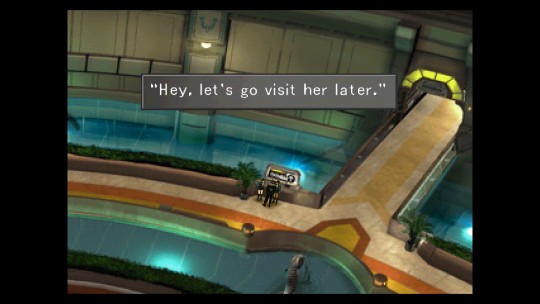
There isn’t much difference in the dialogue between these girls (in fact, it’s surprising how closesly it matches) but I did want to bring it up because it just occured to me that they are likely talking about Linoa, and I think it says a lot about her that in her short time in Balamb Garden, she apparently managed to make friends with some people to the point they want to go visit her in the infirmary.
I suppose it IS possible that they’re talking about an unrelated friend who could’ve gotten injured during the battle of the Gardens and there are more beds that we don’t get to see (it would be weird if there was aonly one) but at the same time, there’s no indication of that in either version of the dialogue. Although with that said, I did notice that there’s usually a group of three girls chatting around and here there’s only two of them, so who knows?
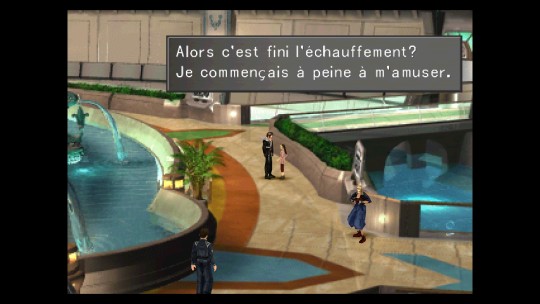
There are a couple interesting things here. The dialogue with Zell is almost identical (also, always found it weird that he’s sometimes in his civlian clothes and sometimes in his cadet uniform in this bit. What a weird thing to put extra work towards), but this little girl’s lines couldn’t be more different. In the English version, she wants reassurance, asking “Is the scary stuff over? It’s over, right?”. But in French, she says “So the warm-up is over? I was just starting to have fun.”
So not only did this little girl apparently take part in the fighting in the French version (which contradicts Squall’s orders, BTW), she’s clearly developed an insatiable thirst for battle that can only be shortly quenched by the blood of her enemies. Terrifying and also great potential for a sequel. Just sayin’, Square-Enix.
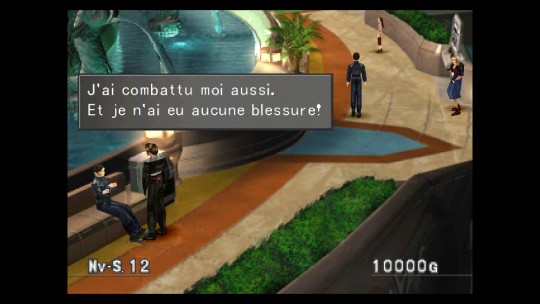
We also have a slight difference in tone with this guy. In English, he sounds still shaken yet thrilled by the battle, going “I...I fought too. And...and, victory was mine!!!” while in French, he’s much collected, going “I fought too. And I suffered no injury!”

Next, we head to the library. This student explains that it is taking request for new books and weirdly, the line in the screenshot above is not in the French version. Another weird change is that he then says that he is “all for fiction” whereas in French, he says that he prefers news. The girl also says in English that she wants mystery novels and in French, she says she wants crime thrillers/whodunits and nothing else.
I guess mystery and crime novels aren’t mutually exclusive, but I feel like “mystery” is a much broader category, so that’s the kind of detail that once again hints at the translations being done independently rather than based on one-another.
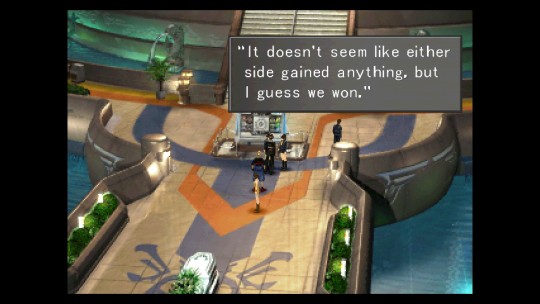
Next we have these two and this one is very interesting. First, in English, the girl on the left asks “So I guess we won?” but in French, what she says is more along the lines of “So I take it we won?” which is really weird because it makes it sound like she wasn’t there and doesn’t know what happened.
But more importantly, the one on the right replies with the above line, which is excellent, but in French, it becomes “You never really know who wins... But yes, I think we did.”
Yeah, the French version dropped the ball on that one IMO.

And finally there’s this bizzarely rare NPC who I don’t think i’ve ever seen before and had to go back and forth multiple times to get to appear after switching to French. She’s sad in both versions but not quite as much in French, where she just laments “oh, this is all so sad” rather than outright crying like here.

I believe that’s it for the first floor, let’s get to the second and meet Selphie! There’s an interesting little difference as she specifically says that the Garden’s BBS is fun, whereas in French, she calls it the “network”, even using the English term, which is surprising considering for once, it’s not a anglicism that we use in this context, really.
You may also have noticed that she’s wearing her cadet uniform, well she adresses that and interestingly, in both versions she calls them “regular” uniforms which might imply it’s not actually a cadet-specific uniform? Squall does keep it in his room even after graduating, so I guess that makes sense. But what’s really interesting here is that in English, she says those are nice for a change as you stop wearing them once you become a SeeD.
So I guess those ARE cadet uniforms but wait, she’s wearing right now so clearly they don’t stop wearing them and I’m way overthinking this, aren’t I? What I meant to talk about is that in French, she kind of has the opposite stance saying that while these uniforms are pretty neat, she prefers the SeeD ones (and she doesn’t mention anything about no longer wearing them).

Quick stop by this guy to mention that he only breakes the fourth wall in the English version, which is surprising considering so far, the French one has been the one to have some fourth-wall breaking jokes.
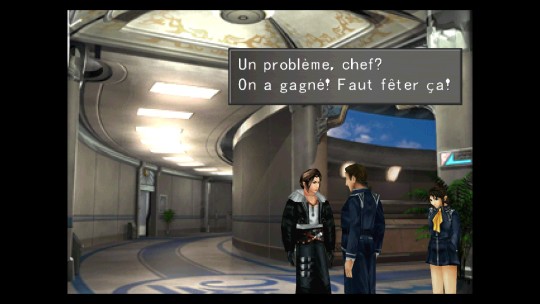
There’s no real difference here (other than the English version sounding more excited due to a liberal use of exclamation marks) but I did want to point out that this is the only NPC so far to acknowledge Squall as his boss.
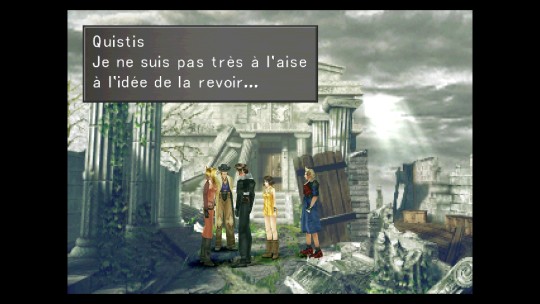
And that wraps all of the interesting bits I could find within Balamb Garden. Time to get to the orphanage! And here we have another example of how nearly identical phrases can have a different vibe in different languages. Here, in English, Quistis says “...I feel uncomfortable seeing her” while in French, she says “I am not very comfortable at the idea of seeing her again”.
Now maybe it’s just me, but I feel like the English take on it makes it feel more like Quistis is uncomfortable seeing Edea at all, as if her very sight made her uncomfortable, whereas the French one feels more like she’s talking specifically about hos strange it feels to go visit her after they nearly killed one-another. Small, but crucial differences.
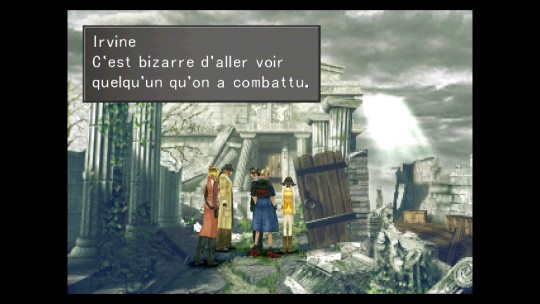
The difference between Irvine’s lines is much more pronounced. In English, he says “There’s so much we want to ask the Matron” and in French, he says “It’s weird to go see someone we fought” (which of course mirrors Quistis’ feelings).

Since the characters not in your team are standing in this area, we’ve got different lines depending on what your party is, so let’s quickly go over them. In English, Selphie says “I’ll go after you, Squall. Ok, ok?” and in French, she says “You speak first, OK?”.
Now that’s a very interesting one because I feel like the French version makes Selphie sound a bit more nervous and relying on Squall to break the ice, which goes to show they’ve come to trust him as their leader, even when interacting with Edea.

As for Zell, in English, he goes “We’re meeting the Matron... M-Man, I’m nervous”. His French counterpart is more calm, saying “It’s a bit stressful seeing the governess after what happened”.

Small thing I noticed, Cid tends to nervously chuckle a few times, which doesn’t happen in French, making him seem a bit more eloquent. For example, here he says “I’m sorry” in the French version.
There is also a small difference before he asks them to forgive Edea where in English, he says “I don’t care about myself... But...” while in French, he says “I know I disappointed you”. Again, one of those small things that does change the overall feel of the scene a bit.

Interestingly, as they start talking with Edea, I noticed that this is a rare (possibly unique) occasion where some of the lines are the same for multiple characters, although it’s all variations of “We attacked you even though we knew you were our Matron” in both versions.
There isn’t a huge amount of difference in Edea’s speech at first, the only somewhat notable one being that in French, she explicitly tells them that she could become possessed again at any given time while in the English version, she trails off after saying “At anyime, I may...”.
Also interesting is that each character has a different line if you try to leave before Edea is finished, which is admirable attention to detail, but also not so great if you’re some sort of fool who for some reason decided to compare two translations of the same video game and has to reboot the game each time to try different party combinations, only to find that the unique lines aren’t different enough to mention anyway.
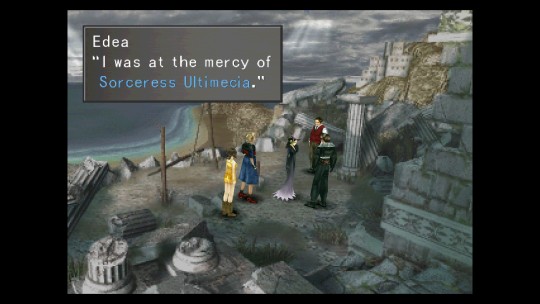
Something I want to point out is another example of the difference in how text is formatted in both versions, as we’ve seen in some of the pre-hiatus entries. As you can see, in the English version, “Sorceress Ultimecia” is highlighted in blue, which is not the case in the French translation, where the name isn’t different from the rest of the text.
We eventually reach an interestng divergence in the speech. Nothing major but in English, Edea explains that "There was no way I was going to let Ultimecia get a hold of Ellone. The only thing I coud do was... ..Surrender my soul to ultimecia and lose control my mind”.
Note how the way she says it here sounds like she willingly let Ultimecia take her over so she couldn’t go after Ellone. Meanwhile, in the French version, Edea says that she “refused to let her bewitch Ellone. In revenge... I am the one she possessed”.
So this one makes it sound more like Edea somehow stopped Ultimecia from possessing Ellone, and Ulti taking Edea instead was a punishment. Quite a different take on the story.

This difference seems to be confirmed a bit later in the English text, where Edea says that if Ultimecia tries to take her over again, she’ll “make a stand this time”, implying she didn’t resist initially. This distinction is absent from the French version.

Another interesting small difference; in French, Edea tells the group “I need you, children” when mentioning the fact that they may be forced to fight again, in contrast to the English version, where she refers to them as “Young SeeDs”. One sound smore like she’s appealing to them as the children she raised, one as the soldiers they’ve become. Once again, it’s a small detail, but one that I think allows for a different reading of the situation.

And now, we get to the part where Edea mentions Adel for the first time.
Ah, crap...
Well, I would have had to mention it sooner or later.
So, the French version did something weird with Adel. Now we all know, Adel is an unusual character in that despite being a woman, she has a clearly masculine body (and I don’t just mean because she’s muscular. Women can be muscular, but she has other masculine characteristics). And I guess the French translator was confused and decided to turn her into an intersex character.
To my knowledge, the French version of the game is the only one to have made such a change and er, yeah, once I found out, it was pretty awkward, and it hasn’t gotten better in modern days where trans, non-binary and intersex representation and rights are a much bigger concern, or at least a more mainstream one. I also want to mention in passing that they use the term “hermaphrodite” which isn’t exactly proper these days, but I want to remind everyone that back then, the word “intersex” wasn’t commonly used (in fact, I’m not sure it existed at all), so I won’t hold that against them at least.
Now, I guess that change in itself wouldn’t necessarily be a huge issue (although it does kind of break the rule that only women can become sorceresses, especially as they usually refer to Adel using male pronouns from what I recall), a bit awkward but ultimately not that big a deal...
... but what makes this so much worse is that, while one variation on how the characters react to Edea asking if they know about Adel, one of the lines (which are shared across multiple characters, at least in the French version), isn’t too terrible, referring to Adel as a “half-man, half-woman being”, there’s one where the character, either Zell or Irvine, uses a term which... well, I don’t know if to call it an outright slur is quite right (it doesn’t help that French people aren’t quite as offended by slurs as English-speaking people tend to be), but it’s not exactly a respectful term for someone who likes to crossdress.
Look, I’m not even gonna bother trying to find an English equivalent, it’s not necessary and that’s one can of worms I am perfectly happy leaving closed. I just wanted to bring it up because I feel it would be unfair to you to hide it. I don’t even think the translator was trying to be insulting to anyone, it was just a very poor judgment call that ended up messing with canon and creating an unfortunate situation for no reason. Know that we here at the Translarison say “Trans Rights!” and “Intersex Rights!” and I know damn well that the FFVIII cast does as well, awkward translations be damned.

With that out of the way, back to business. Edea mentions that she received her powers at the age of 5. This seems to confirm that she was already a sorceress before reciving Ultimecia’s powers. There is also a difference in translations as in English, she says that she received her powers from “the previous sorceress” which sounds like there can only be one at a time (which is immediately contradicted by them bringing up Adel).
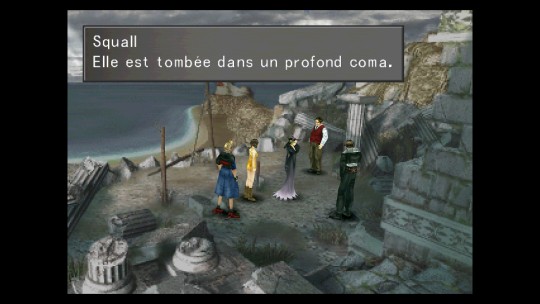
Next, when Squall brings up Linoa, his English self says that her body was called and she wasn’t moving, so no wonder Cid took it to mean that Linoa died. However, his French self says that she “fell into a deep coma”, which IS accurate, but also makes it weird that Cid still has the same reaction.
Speaking of him, his reply to Squall sounds more tactful in French to me.
English:
“Squall, I understand how you feel. But you are in a position of leadership. The other students at garden have a right to know the outcome of the battle and what’s to come. Take whatever information you can get here, back to Garden. Remember, it wasn’t just Linoa. Everyone fought.”
French:
Squall, I understand that all this is emotionally exhausting for you. But think about your role as leader. The BGU students are relying on you. You mustn’t forget about the fate of your comrades. Linoa’s life isn’t the only one on the line.
And after Squall says “I understand, but...”, Cid still comes off better in French, as English Cid retorts “But, but, but... that isn’t something a leader should say...” which sounds horribly dismissive, while French Cid says “No ‘buts’. A true leader forgets his personal issues...” which not only feels less dismissive IMO, but also seems to refer back to his own actions, as he had to train SeeD to fight Edea in spite of his own feelings.
Oh, and when punching the wall afterwards, French Squall thinks “...... Fool” and I’m honestly not sure if he’s referring to Cid or himself.

There aren’t many differences while Edea explains Ultimecia’s goal and Squall reminisces about Linoa, but there is an interesting one. In English, when someone asks what would happen to the world if time was compressed, someone else answers “I can’t even imagine a world where time is compressed!”.
In French, Edea (presumably) clearly answers “If time is compressed, we will all plunge into nothingness.

And as the game fades back to Balamb Garden, we end with Xu a.k.a. Shu. In English, she tells Squall “I don’t want to say this in front of Quistis and you, but... I don’t know if some people will be so forgiving”. In French, she doesn’t actually speak directly to Squall, whispring to herself “Squall and Quistis are too king with the priestess. I’ve got the feeling that the others won’t forgive her so easily”. And yes, it’s a whisper because it’s not using the transparent text box.
Well, that is it for our first entry back. I hope you enjoyed it as much as I did (the weird Adel stuff notwithstanding) and that you’re looking forward to more, I know I am. Don’t hesitate to let me know what you think of it and if you have any questions, my asks are open and of course you can leave them as a comment if you prefer.
Take care and I’ll be seeing you for part 26. No promises on when it’ll be out, but hopefully before another four years.
#Final Fantasy VIII#FF8#FFVIII#Final fantasy#Final fantasy 8#translation#localization#localisation#comparison#difference#variation#video game#RPG#JRPG#English#French#language#Not giving up#Edea#Kramer#Cid Kramer#Orphanage#Balamb Garden#Trans rights are Human rights
13 notes
·
View notes
Text
I just mined the entirety of the French court records from the new version of Apollo Justice Trilogy.
It's very interesting to see how the localisations carry over from English to French.
Some of my favourite new names include Alex Plausif (Ted Tonate), Arsène Loupet (Phineas Filch), Icare Solo (Solomon Starbuck), Calami-tron (Clonco), Sterh'uey Tu'heiven (Pees'lubn Andistan'dhin) and Richard Laudienz (Roger Retinz).
Also, Turnabout for Tomorrow has the much more touching title "Demain est une autre volte-face" ("Tomorrow is another turnabout...").
You can download these records at archive.org/details/aj-trilogy-vf.
EDIT:
I've uploaded a second .zip now at archive.org/details/aj-trilogy-vf-vol-2.
It contains:
* The court records for the past trial of Turnabout Succession (I forgot to include them in the main volume because they're not on the MASON System)
* All promotional and concept art (including modified versions of the game completion banners)
* The entire chapter select lists in French (Apollo Justice previously lacked a chapter select, Dual Destinies and Spirit of Justice previously lacked French versions)
* All music tracks not actually from the three games, plus the chibi orchestra sprites of Phoenix, Apollo, Athena, Trucy, Klavier, Ema, Lamiroir, Blackquill, Nahyuta and Rayfa
5 notes
·
View notes
Text
Okay, at first I was only mildly interested in the forthcoming PC remake of Atelier Marie, but now that it's been confirmed that the English version will be bundled with a first-party localisation of the original game I'm very curious to see how its script will differ from that of the 2019 fan localisation.
407 notes
·
View notes
Text
LONG HELL-GERMAN IN "DISCO ELYSIUM"
The German version of DE will sometimes play up the *bureaucratic hell-german* to fit the tone, such as the anti-object task force
ANTIOBJEKT-EINSATZKOMMANDO

My personal favourite being "misconduct fine" which is too long for the dialogue box
ORDNUNGSWIDRIGKEITSBUSSGELD
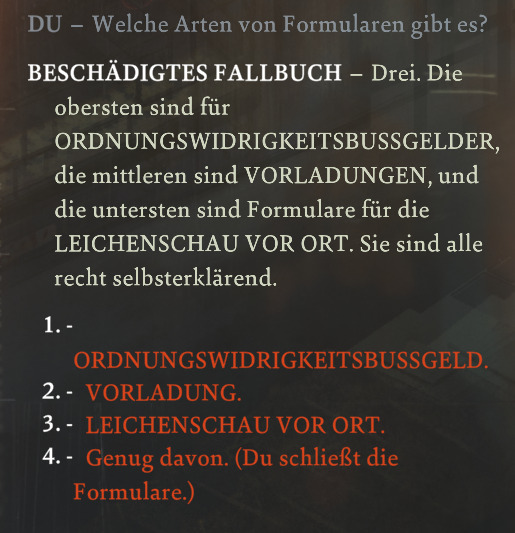

lit. order misconduct fine money (and it sounds absolutely like something a policeman would bark at you)
#disco elysium#german disco elysium#fun with translation#localisation#german language#harry du bois#thought cabinet
249 notes
·
View notes
Text
I'm learning more about "localisation discourse" in the anime fan community and my god it is so stupid. The arguments are so incestuous, like people in these discussions (both sides!) haven't ever considered what translation or localisation is outside of the context of anime and manga. Like lots of anime fans say they "hate localisation and want accurate translation" - and then the translators are like "localisation is accurate translation". Both sides are just talking past each other.
I believe that the translators are doing nothing wrong - if a translation reads naturally and conveys essentially the same meaning as the original, that’s a good and accurate translation. The “anti-localisation” crowd are abusive and awful. But both sides of the discourse are terrible at communicating.
First of all, the word “localisation”, as it is understood outside the weeb community, means “adapting a work or product for use by a different population than the original (usually a population of a different geographical region)”. As a programmer, I deal with localised text in our product - for example we have different localisations for Australian english text (en-AU) vs British english text (en-GB) vs US english text (en-US). Yet, many anime/manga/etc translators call themselves localisers - what variety of english are they supposedly localising the content into? Probably US english, but it’s certainly not specifically americanised a lot of the time (e.g. Kimetsu no Yaiba isn’t being americanised in any translations I’m aware of), and the days of jelly donuts are far, far behind us. Erasing japanese cultural references is no longer "more marketable", and hasn't been for a long time. Most anime translations (including the ones that the “anti-localisation” crowd complain about) are simply translations into an international variety of english, and decidedly NOT localisations.
So if the “anti-localisation” crowd aren’t complaining about localisation, what are they complaining about? They often say they want “accurate translations”, but this isn’t true either. An “accurate translation” is a translation that simply conveys all the information from the original. おはよ!→ “Sup bro” can be an accurate translation, but I’m sure the anti-localisers wouldn’t agree (おはよ and sup bro are both just phatic greetings, we don’t need to specify morning unless it’s not obvious from the visuals that it’s morning). What they actually want is a translation that “sounds right”. This may seem impossible to deliver since it is so unspecific, but I think it’s actually quite simple - in short, overly-weeby translations have become their own variety of english, which I’ll call en-WB. Often fan translations are in this specific dialect because the fan translators haven’t studied actual translation and simply know what “sounds right” in en-WB.
For example, these anti-localisers often say they are annoyed that honorifics are removed. To a regular old translator with no knowledge of the anime discourse, this is very silly because -chan and -kun are not present in any common variety of english, so why would they appear in the translation? To divorce this discussion from anime briefly, a very good translator who is translating a full length Japanese novel would adapt the relationship/hierarchy dynamic via speech patterns and phrasing, rather than using the honorifics directly. But the anti-localisers don’t want a brilliant translation into international english, they want a passable translation into en-WB.
Both sides of the discourse are misunderstanding each other, using dumb arguments that completely miss the point. Anti-localisers are saying shit like ”fan translations are better!!” which really means “fan translations sound like how I expect the translation to sound, and pro translations do not sound like that” which means “fan translations are translating into the english dialect I expect and pro translations do not”.
Meanwhile pro translators are saying “pro translators are fans too!! And how could an amateur be better? We studied to do this professionally!”. But this is flawed logic - the lack of formal training in translation is ironically what enables fan translators to translate into en-WB correctly. Pro translators of course could translate into en-WB if they wanted to/were told to, but they don’t - they want to make the translation as accessible as possible to all viewers, meaning that making the language natural and internationalised is the correct course of action.
To me as a half-japanese person who has grown up with smatterings of anime from an early age, anime is just cartoons to me. It's just another tv show, there's nothing special about it. So when I talked about translation as I have in previous posts, I was basically unaware of this stupid discourse and was simply discussing translation as it exists outside of the anime/manga industry - rewriting a work as if it were originally written in the target language. In principle I don't believe anime should be treated any different to other tv shows when being translated, and I personally hate en-WB, it's like nails on a chalkboard to me. But that's what a bunch of anime fans want, and that's fine. They can have their (in my eyes) terrible translations, and I can have my (in their eyes) terrible translations.
If we were talking about translating literature or live action tv or news articles instead of anime we wouldn't be getting any of this discussion. I think it's almost entirely the fault of anime's history with fan translations and heavy handed cultural erasure by 4kids etc that's led to the current state of things. And unfortunately those things still influence how people think about anime translations now. I just want to approach anime translations like I would any other translation - but the existence of this discourse adds an annoying layer over it all.
#localisation#localization#anime#anime and manga#japanese language#translation#japanese#langblr#jimmy blogthong
116 notes
·
View notes
Text
On peut dire ce qu'on veut de tumblr mais personne fait la localisation comme eux.

2 notes
·
View notes